#aphrodite gow
Text

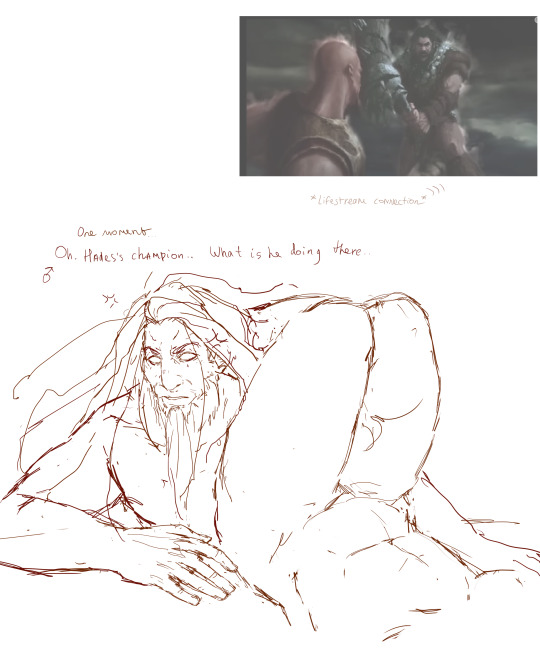




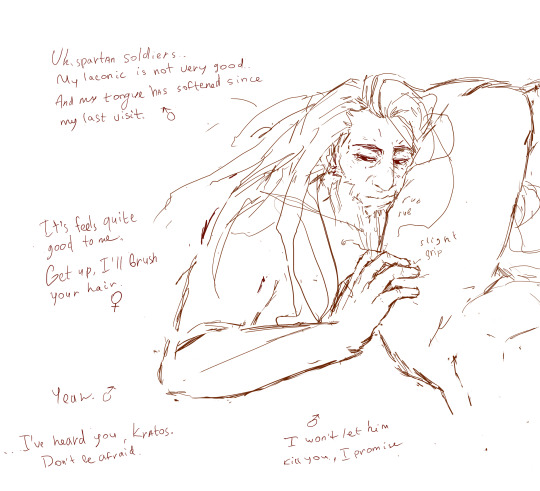
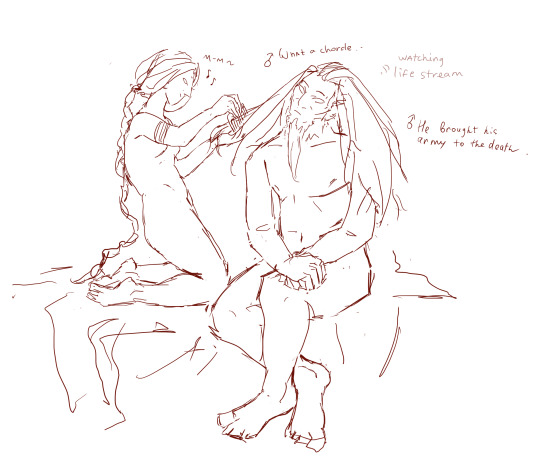
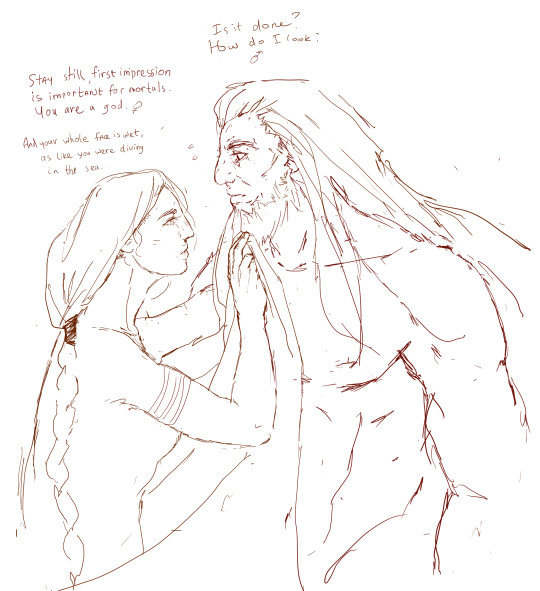


Ares: *minding his own business
Kratos: *dramatically crying for help somewhere on earth
Ares: Are you serious? Right in front of my salad?
Ares: *throwing away all his business and running to an aid
___
Yes, here is Ares/Aphrodite and eating some sea salted salad, because as Haephestus said in GOW3, Ares is a conquered god of war. And Ares kinda feels absolutely not ashamed of it, you know. But at the same time he has duties in his domain and plan of Olympus's fall.. And he wants to live his life in between.
Anyway, the point is that time is running a bit differently for gods and for Olympus, okay? That's why Ares managed everything during the Kratos's prayer and jumped from the sky right in the moment to save his life. A god of good endings!
#god of war#gow#greek mythology#ares#aphrodite#kratos#ares x aphrodite#i regret nothing and I think about them a lot in god of war game canon. Aphrodite just loves this red-haired dork#ares god of war#aphrodite gow#sorry for handwriting I hope it is readable#greek gods
63 notes
·
View notes
Text
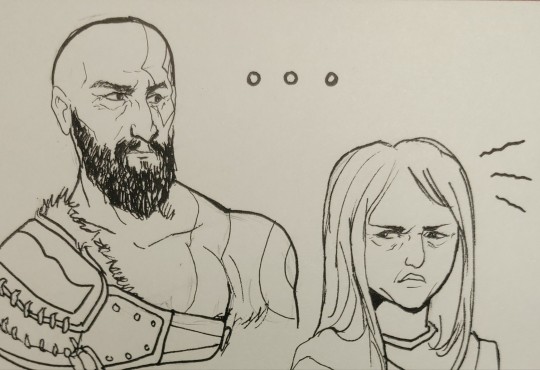

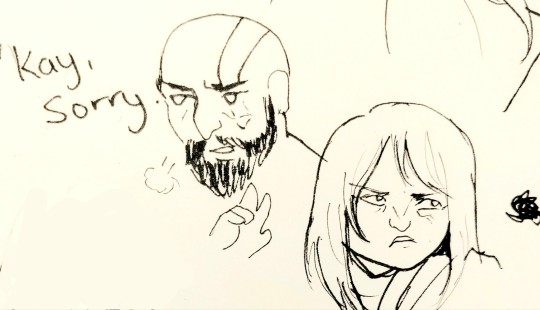

Reunion with Aphrodite didn't go so well
#she proceeded to yell at him for four hours#sequel to the other one lmfao#doodles#imagine him coming back after killing your husband lover AND daughter GOD#gow 3#god of war 3#god of war 4#god of war ragnarok#Aphrodite gow#gow#gow ragnarok#justin's art#Aphrodite
57 notes
·
View notes
Text
One of the biggest reasons why Kratos was able to actually defeat the Olympians easier to compared to the Norse pantheon is because they’re not really trained combatants. The Titan war was thousands of years ago, and frankly, besides Ares and Athena they’re probably not training much in traditional combat. Unlike, the Æsir, where they’re constantly sparring and fighting is what they live for. Thor could easily tear them apart.
The Olympians are spoiled and too dependent on their godly powers. They can’t fathom that they could die while the Æsir prepare for it. It would be interesting to see Rome because that society is focused on war, much like Sparta. The Olympians would’ve learned from this. Rome conquered over thirty countries. Even Mercury would probably be formidable, or at least, better trained than Hermes was.
Aphrodite was a war goddess in Sparta but in Rome she is their mother much like Mars is seen as their father. Ares was immature and reckless, Mars is mature and strategic (probably compensating for the lack of Athena/Minerva). Them tag-teaming Kratos and Freya would legit be the hardest fight of Kratos’ life, and he already struggled against a depressed Thor.
#god of war#god of war ragnarok#kratos#freya gow#mars gow#venus gow#ares gow#aphrodite gow#don’t think mars would be the ultimate villain because it’d be them repeating plots again#and I think mars is going to be a mirror to Kratos where he is also tired of being a conquerer and just wants to go home and farm#much like how young Kratos sort of became Ares and turned into a conquerer as the god of war mars becomes an older kratos
101 notes
·
View notes
Text
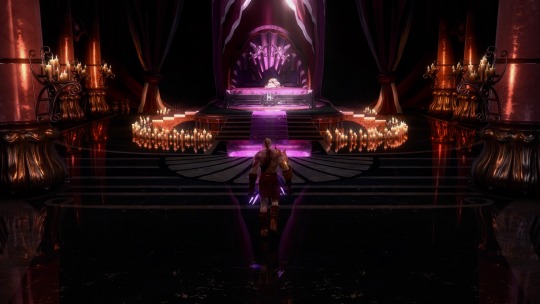
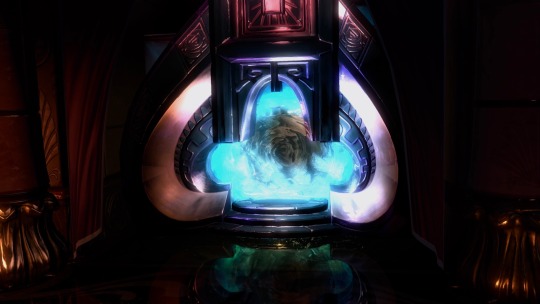

god of war III remastered ~ aphrodite
developer: santa monica studio
#god of war III remastered#god of war III#god of war#gow III remastered#gow III#gow#aphrodite#gow aphrodite#god of war III remastered scenery#god of war III scenery#god of war scenery#gow III remastered scenery#gow III scenery#gow scenery#game scenery#scenery#game photography#virtual photography
11 notes
·
View notes
Text
aphrodite said this with no hesitation
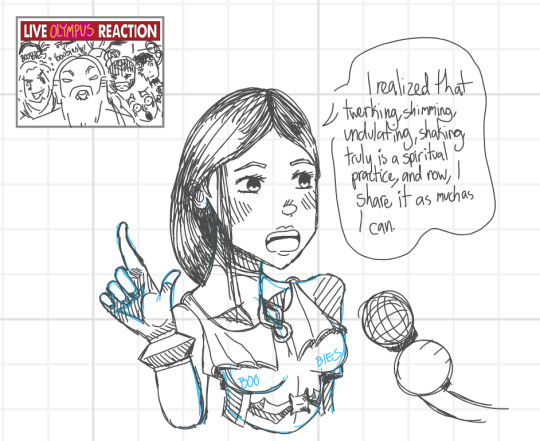
this was streamed on live tv btw (boobies included)
22 notes
·
View notes
Text

Very productive conversations going on
#shitpost#oc#gow#gow oc#gow ares#gow aphrodite#god of war#god of war oc#god of war ares#god of war aphrodite#alectryon
24 notes
·
View notes
Text
Aphrodite: Hello, Kratos.
Kratos: Aphrodite!? I don't have time for your games.
Aphrodite: *taking of earrings* Oh, that's fine. I hate games anyway.
Kratos: Than move.
Aphrodite: I would, but I can't let you destroy Olympus. *Bites off acrylics*
Kratos: ...
Kratos: Wait, are you about to--
Aphrodite: *Mollywhops the crap outta him"
Kratos: WHAT IN THE HADES!!??!?!?
#god of war#gow#god of war 3#kratos#aphrodite#aphrodite ariea#she was a patron o f sparta after all#you know it serious when she takes the acrilics off#incorrect god of war quotes#comedy#...if you will....#greek mythology#greek gods#incorrect greek mythology
39 notes
·
View notes
Text
The remaining Olympians doing a headcount after Kratos leaves Greece to fuck around in Midgard

#god of war#from what I could find it sounds like a few gods are still kicking#Aphrodite (obviously)#Artemis#Dionysus#and MAYBE Apollo#would definitely be interesting for Atreus to meet them in any future GoW stories...
46 notes
·
View notes
Text
WAIT WHAT??????
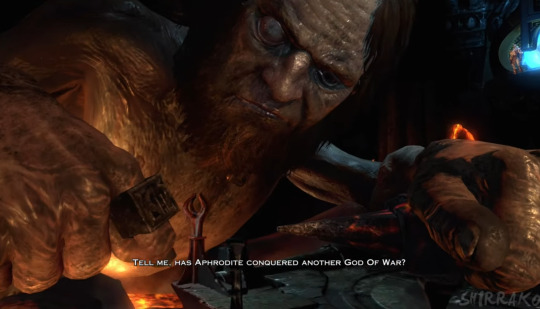
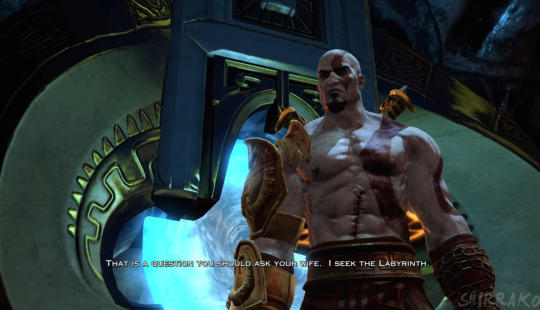
Did Aphrodite banged Kratos only because he was the GOD OF WAR??? And was Hephaestus hinting at the fact she slept with Ares too???
#gow#god of war#god of war iii#greek saga kratos#greek kratos#hephaestus#gow hephaestus#damn bruh#Aphrodite really wanting that God of War dick#also the fact Kratos immediately shut him down with that sentence lol
14 notes
·
View notes
Text

Rethinking of Aphrodite from gow3. The Uranide...
I used her concepts as an inspiration and I am very pleased. It was sad to see her lost in the lust in gow3..
I wanted to draw pre-canon, how she used to look at Ares, when he returned after a really long periode of absence on Olympus. She looked at how he walks to his throne room, burned out, just ran away from his mother, washed, dressed up and turned out so tidy he almost creaks. And Aprodite, looking from the distance, was like:
"Looks like Olympus was finally blessed by having a prince".
And Ares, after finally noticing her and a bit shy about his almost forgotten birth title, is like: ".. It was blessed, when you came here", means the moment he saw her for the first time and fell in love immediately.
#Sadly we didn't see their children in a game... this would bring a good drama to the plot#I am weak about their relationship#god of war#gow#ares#ares god of war#aphrodite gow#aphrodite#ares x aphrodite#greek gods#greek mythology#god of war 3#god of war headcanon#god of war ragnarok
65 notes
·
View notes
Text

An awkward interaction 😅
Atreus meets an older Artemis & Aphrodite in his travels
#A team if you will#doodles#forgive the very likely inaccurate Greek Byzantine clothing fbdghf#god of war#gow artemis#gow atreus#gow aphrodite#gow#gow ragnarok#fan art#fanart#theyre still kickin!!#justin's art#aphrodite
98 notes
·
View notes
Text
The thing is, sure Heimdall could beat Hermes in a fight, but it would still end with him becoming the Olympus court jester. Freyr would fight Ares to the death in order to be Aphrodite’s little pogchamp, though.
#god of war#god of war ragnarök#heimdall gow#freyr gow#hermes gow#ares gow#aphrodite gow#Freyr would be so popular on Olympus
109 notes
·
View notes
Text
If your understanding of Hephaestus as a character and his relationship with Aphrodite comes solely from the GOW Games maybe stfu idk
#I’ve been seeing so many annoying dudebros acting like they know the mythology#calling Hephaestus and Aphrodite all kinds of names#ppl complain about the negative influence Lore Olympus had on pop culture’s perception of mythology#we don’t talk enough about how the god of war ga#games do the same thing but with gamers#greek mythology#ancient greek mythology#hephaestus greek mythology#hephaestus god#hephastios#hephaestus x aphrodite#hephaestus#hephaistos
26 notes
·
View notes
Note
If thr Olympians and Norse Go da met after the GoW games. Who would get along and who wouldnt?
Also Brok and Sindri becoming best friends with Hephestus plz.
Odin: If everyone had just LISTENED to me and done as I said none of this would have happened. Everything would have been hunky dory and I wouldn't have had to commit genocide! But nobody goddamn listens to the smart people.
Athena: I understand completely. Kratos just wouldn't fucking listen.
Odin: Oh don't get me STARTED on that Kratos prick. I offer him peace and he starts Ragnarok!
Athena: That idiot went gave Hope to humanity! HUMANITY! They don't know what to do with it!
Odin: Exactly! Athena, I don't know how you've survived surrounded by these idiots.
-
Thor: ...
Hercules: ...
Thor: Hn.
Hercules: Huh.
Announcer: FRIENDSHIP ACHIEVED!
-
Brok: I tell ya', no one respects proper craftsmanship these days! It's all just "git 'er done", not respectin' the fuckin' time and effort ya gotta put in to get this shit workin!
Hephaestus: Forging is a mnarathon, not a sprint. But Nooooo! It's all "Heaphaestus, make me this sword in a week". No respect for the craft.
Brok: Here, here! But I gotta goddamn say, you've got some magic hands there Hephy-boy.
Hephaestus: Well, I've had plenty of time to practice. No one... no one really wanted me at social engagements at Olympus.
Brok: Well fuck 'em. Yer all dead now, same as all.
Hephaestus: Yeah, I guess. I just... I wish I'd been a better husband to Aphrodite. She cheated on me, yes, but I'm afraid I never had much time for her.
Brok: Eh, ya never know brother.
-
Heimdall, strangling Ares: I'LL KILL YOU AGAIN YOU PIECE OF SHIT! THIS IS ALL YOUR FAULT! AAAAAGGGGGHHHH!
Ares: Alright- enough!
*Ares breaks out of Heimdal's grab and proceeds to give him a beatdown*
Hera: I'm just glad he's finally making friends.
#incorrect super smash bros#God of War#Ragnarok#Odin#Athena#Thor#Hercules#Brok#Hephaestus#Heimdall#Ares#Hera#Mythology#Greek Mythology#Norse Mythology
148 notes
·
View notes
Text
Now Ragnaroks been out for a time. I like the Odin using the excuse of doing it for his “family” after killing Thor. Echoes the same sentiment as Zeus claiming he is killing Kratos for the good of Olympus. In addition, this doesn’t work to placate Kratos because Odin is practically strong arming forced labor from the Dwarves and has Tyr imprisoned somewhere. Just as Zeus imprisoned the Titans, when he could of possibly forged a lasting peace with them. Odin SAYS he was young and foolish at the time but it is just an excuse, just as the one Zeus told himself. That what he did was for the good of all. Even though, like Zeus, Odin cannot see the corruption he infested himself with. And while unlike the Olympians who were too far gone to be aided, Sif and Thor are trying to make amends by making a new future for their remaining daughter after losing Modi and Magni. What were once abusive, drunk tyrants controlled by Odin’s whims are now characters looking to the future. Thor is obviously having a rougher time of it. As he is wrestling with centuries of alcoholism now going through withdraws while being ordered by Odin to aid one of the reasons his sons are dead while having his armor pierced by the abusive nature of Odin. Though, we know not all the Norse Gods are saints, Heimdall would be right at place with the Olympians for his arrogance and cockiness. But, unlike Helios’s head, Mimir was a willing participant in his brief deicide and is now a stead fast ally to Kratos and Atreus. Kratos probably remembers the final moments of Hera, when he sees Freya and rather than destroy another Goddess of Nature’s realm is actively trying to negotiate with her. Helping with her own realm rather than killing her in his old fury, he seeks to see a means to keep moving forward. In her brother, he uses his past experience with his own brother and considers how a celebrated Alfheim hero would be good to have around. When Kratos approaches Surtr, he probably remembers Hephestios. Who aided him up until he threatened Pandora. Instead of blustering his way through and shrugging off, Kratos takes AMAZING care to listen and understand Surtr’s hang ups of becoming Ragnaork. And then there is Tyr. Having only known Ares to be a brutal and callous God, Kratos does not force Tyr to go through anything he is not prepared for and actively councils Atreus away from leaning too heavily on the old God of Wars’ presence.
Additionally every God from the Norse, he comes across, he gives a way out to just walk away. Seeing the mistakes he made in Greece in each of the Pantheon and although Heimdall, Odin, Modi, Magni, and Baldur reject the offer. Freya, Mimir, Tyr, and Freyr accept it. And in doing so, Kratos might be finding solace that he is worthy of the same forgiveness. To move past his mistakes and create something new in this new realm after utterly destroying the last and most importantly ensuring the sins of the father, do not become the sins of the son in the raising of Atreus. In parting harsh lessons at first but then trying his best to provide better philosophies to his child. And Atreus is shaping up to be a better man than Kratos, which makes him proud and shows his efforts are worthy. After shaking of Athena’s last influence on himself, Kratos will eventually be worshiped in a way Odin could only dream. The crown of power ill suits the man who seeks it and better fits the man who does not.
Greece may never return to what it once was but with the hope, Kratos released at the end of GoW III maybe the survivors are building a new realm with only...maybe Aphrodite and Athena still being around to influence them. But unlike with Greece, Kratos has brought down Asgard to stop a different corruption of a different God. With every intent to save its mortal citizens and actively help in their settlement after their fall. Trying to even fight the Gods who move against him to stop him. In an attempt to not repeat another Olympus fall. Ensuring to save everyone he can on the way. And rather than seeking the destruction Asgard as he did Olympus. This older Kratos is following every path to stop Ragnarok from occurring. But never allows himself to be influenced by Odin or any God ever again. Breaking bread with those he makes peace with and reluctantly killing those who force his hand. Seen in his sorrow and deep seated confliction after killing even Heimdall who probably sees the visages of Hermes in. An arrogant, taunting God. Who is just an absolute ass.
Its bittersweet to see much of decisions reflected in Ragnarok juxtaposed against every decision in GoW3. But I think the best decision is Kratos seeing how Atreus handles the Angraboda situation over how Kratos was nearly powerless to actually help in the Pandora situation. Both women who were crucial to their own pantheon’s doom. But Atreus words in having Angraboda find her own path beyond fate ushers in an ending much kinder than when Kratos tried to stop Pandora from accepting her own fate. Which, learn at the end of GoW3, was a sacrifice made in vain.
A nice bow on top of Kratos’s brutal begins meeting a somber, quieter end. But a far better one than when we left him at the end of the last major series.
20 notes
·
View notes
Text
“The Greek veil (before the fourth century at least) was usually created from a garment that served an additional purpose, usually a voluminous mantle or robe that covered much of the body. A number of words, such as epiblema and periblema (together with the associated terms epibolaia, epiblemata and epibolaion), in a variety of literary sources have the general meaning of ‘that which is thrown over, around or about’. They seem to be synonyms and appear to refer to a large piece of cloth which can be utilized as various garments and even as bedspreads or other coverings. Generally though, they act as mantles and cloaks that have the potential to be pulled forward over the head to form veils. As Richter notes: The epiblema is a kind of shawl ‘thrown over’ both shoulders, covering back and sides. In a way it corresponds to the later himation, in that it hangs down freely, and that it is … sometimes pulled over the back of the head … as the mantle was so often in later times. Sometimes, on the other hand, it was worn covering the chest, with the ends hanging down the back. The epiblema could be long, trailing on the ground, or quite short. Her definition correctly suggests the flexibility of the garment and the notion that, be it long or short, covering the head or flung across the chest, the garment might still be classified as an epiblema or periblema. . . The word ampekhone (or ampekhonon) can also be classed under the general heading of epiblemata, deriving as it does from ampekhomai (to drape), and it can also have a meaning of ‘outward appearance in dress’ in general, confirming that it is the outer and hence the most prominent item of clothing. More specifically, though, it refers to a female outer-garment, most probably a veil, which is especially noted for its delicacy and semi-transparency: Hesychius and the Suda classify it with the words summetron periblema and lepton himation and Pollux endorses these definitions by calling it a himation, a stole, an amphiesmata and a micron periblema.
The ampekhone is understood by Gow as, the wrap regularly worn by women, which resembles an ample himation but is often made of very thin and clinging materials which allow the heavier folds of what is worn beneath to show through … [When worn out of doors [it] usually envelops both arms and also hoods the head. The fine and expensive quality of the garment is endorsed by the fact that it can be perfumed and, as such, it is discovered in the textual evidence as part of a hetaira’s armoury of charms, while its transparency is attested for by the comic playwright Pherekrates, who observes a group of prostitutes whose ampekhonai are – in the speaker’s imagination at least – revealing enough for him to see their pudendas. The delicacy and fragility of the garment is highlighted in Theocritus’ story of an Arkadian shepherdess who tears her flimsy ampekhone during her first sexual experience with her lover, who accordingly promises to buy her a bigger and (by implication) a better one: . . . It appears, then, that the ampekhone could be an expensive garment. It is not surprising to see it listed among items of textile dedications in shrines to major goddesses, in particular at sanctuaries of Artemis. On the Athenian Akropolis, an ampekhone is recorded as being draped over the statue of Artemis, which renders feasible the word’s translation as ‘veil’. The word occurs three times in the clothing inscriptions at the Artemis Brauronia sanctuary: on two occasions the garment is draped around the statue (one of these particular cloths is woven with the words ‘sacred to Artemis’), while the third reference to an ampekhone has it as a dedication by a woman named Mnesistrate and states that it is contained in a wooden presentation case.”
- Aphrodite's Tortoise: The Veiled Woman of Ancient Greece, Lloyd Llewellyn-Jones
7 notes
·
View notes